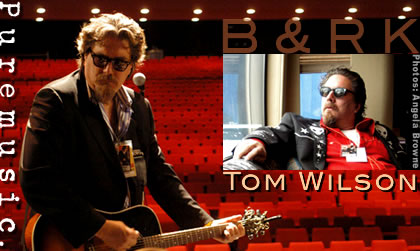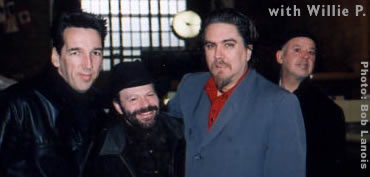
A Conversation with Blackie & the Rodeo Kings (cont.)
TW: So Junkhouse didn't really fit into the mold of the Nirvana, Pearl Jam, Screaming Trees thing. It was kind of its own thing, went down its own path.
PM: It's amazing when something comes in that comes in so hard for a time and then it goes. I knew a guy who was in L.A. at that particular time, and he had a band that sounded like the Red Hot Chili Peppers. And then Nirvana broke, and he quick switched his sound to that, and then they became the Stone Temple Pilots.
TW: I think what separated Junkhouse from the trend is probably the same thing that separates the three members of Blackie and the Rodeo Kings--I go back to the fact that folk music still had a lot to do with what went on in that particular rock band.
PM: In Junkhouse?
TW: Yeah, for sure. Because one of my first influences was Canadian folk music, and I relied on that as a reference point always. So to me, that era of whatever I was doing was pretty true to my roots, and I wasn't trying to be fitting in with the pack. And I kind of feel that that's the same way Blackie and the Rodeo Kings operates. Although we could be categorized as Americana or roots music because that's where the basics are, I think the fact is that Canadian folk music is kind of a foundation of the band.
PM: Right. And is Willie P. still playing with Fred? [see our interview with Fred Eaglesmith from a couple years ago]
SF: Yes.
PM: I've seen him play tiny little clubs with Fred before, and the "Jimi Hendrix of the mandolin" title he's been given is certainly well earned. He's a monster.
[laughter]
CL: I heard it was "Keith Richards of the mandolin."
TW: That's what I heard too.
PM: I'd rather be that.
SF: Well, Willie is just playing so great. He's still writing great songs.
PM: Do his songs get covered in Fred's band?
SF: No.
PM: Is he putting out records of his own very often?
CL: He did a few years ago, but it's been like four years now.
PM: He's working on another one, I've heard. Well, he won a Juno for an album called Heartstrings.
CL: About 2000, maybe?
SF: Yeah. That was his first Juno.
PM: I mean, it's so rare that somebody starts a tribute band concerning the songs of a living singer, a living writer.
CL: Well, I thought that there were always bands like the Blushing Brides who did the Stones--this is on the Toronto rock circuit--and what are they called, some U2 band, the Hollow Men, it would be just U2 songs. So the idea was like being a stupid ass cover band, but it was sort of our idea.
SF: Ultimately it's still sort of a big part of what we do, even though we do our own stuff.
TW: It's one of the things, one of the common things that ties us together.

SF: It gave us a way to come together and sort of consciously pitch aside all of our own particular agendas. We came together on the music. The idea was to take Willie's songs and put them out as this group that really didn't have an identity. Colin has worked with Willie so many years that he had a really great handle on the music and the vision of where the songs should go. And after we'd made that first record, High and Hurtin’, it laid down a template for us. Roles were defined within the scope of our little band around Willie’s music. Then we decided to go on from there. It's a really interesting way to put a band together. It happened quite by chance in a cool way like that.
PM: It's a fabulous thing, because songwriters are not famous for putting our agendas aside for the songs of another.
CL: It was kind of a relief to go up there and not be worried--I mean, when we decided that we would go out and play, we made a couple of rules. And the first rule was that it was the band that never said anything or did anything--be it an interview or a video or a show or anything--unless it was going to be fun. And most of the time we've been able to adhere to that. Sometimes we've taken a few risks and it hasn't panned out that way. But for the most part. So it was kind of a relief. We didn’t have to give a damn what it did, because we put all of our energy about caring how we do into our own things instead.
PM: Yeah, right, right. "I got plenty of that going on already."
CL: It's a great element of relief to know it is the place that you could go to where you didn't give a damn about anything but the music and having a good time.
SF: And also, I learned something really important from playing in this band, which is when you say no to a promoter, or no to a festival or no to anything, what happens after that. As a solo artist, I've never felt I had the luxury to do that, because if I say no then they might not hire me again. But with Blackie, it's like it doesn't matter. So you say no, and then they suddenly come up with more money.
CL: That was a good thing to learn. We do things because we want to do them, because they’re fun. And it's quite incredible what happens when you put that forward and live by that creed. It’s been an interesting time--with Bark being sort of a successful record in Canada, it's been an interesting challenge to keep ourselves on the right path that way.
PM: So when you say it's becoming a successful record in Canada, what kind of numbers is it enjoying? Where's it going?
CL: The last one, Kings of Love, sold 15,000--which, for a roots record in Canada, was really good.
SF: We've done a lot better on this one.
PM: Already.
SF: Yeah. I mean, we're a long, long way from gold, which is fifty in Canada.
PM: Gold in Canada is 50,000?
CL: Yeah. But given the fact that artists like Richard Thompson sell 5,000 or 6,000 in Canada--
PM: What?
CL: Our country is a tenth the size of America.
SF: We're the same population as New York.
PM: Oh, my God!
CL: There’s about 27 million people in Canada.
PM: Oh, I didn't really have a handle on that. And the country is huge. That's amazing. I had no idea.
CL: If you think of bands like Blue Rodeo, who are friends of ours, who are kind of a roots band, I guess they got hits at the time when you could get hits doing roots music. And you think about that group that has sold about three or four million albums in Canada. They're a gigantic band. Think about how hard they had to push it to get to that crowd. continue
print (pdf) listen to clips puremusic home